 There is one who plants, one who waters and still more who weed (and even one who "talks with them!) -- but we all know that it is God who gives the growth. And, indeed, we have much for which to be grateful this year! Amid the busyness of our renovation (update forthcoming) it seems that there has been less time than usual to tend the vegetable garden; despite this, however, we have window-sills full of ripening tomatoes. In fact, we are quickly running out of window-sill room! (Not a bad problem to have.)
There is one who plants, one who waters and still more who weed (and even one who "talks with them!) -- but we all know that it is God who gives the growth. And, indeed, we have much for which to be grateful this year! Amid the busyness of our renovation (update forthcoming) it seems that there has been less time than usual to tend the vegetable garden; despite this, however, we have window-sills full of ripening tomatoes. In fact, we are quickly running out of window-sill room! (Not a bad problem to have.) 24 August 2006
God of all Fruitfulness
 There is one who plants, one who waters and still more who weed (and even one who "talks with them!) -- but we all know that it is God who gives the growth. And, indeed, we have much for which to be grateful this year! Amid the busyness of our renovation (update forthcoming) it seems that there has been less time than usual to tend the vegetable garden; despite this, however, we have window-sills full of ripening tomatoes. In fact, we are quickly running out of window-sill room! (Not a bad problem to have.)
There is one who plants, one who waters and still more who weed (and even one who "talks with them!) -- but we all know that it is God who gives the growth. And, indeed, we have much for which to be grateful this year! Amid the busyness of our renovation (update forthcoming) it seems that there has been less time than usual to tend the vegetable garden; despite this, however, we have window-sills full of ripening tomatoes. In fact, we are quickly running out of window-sill room! (Not a bad problem to have.) 21 August 2006
One Last Journey

Today marks several noteworthy occasions. It is the 439th anniversary of the birth of Saint Francis de Sales. Also, it would have been the 98th birthday of our Sister Anne Marie who went home to the Lord on 5 July. And this morning, we made our "last journey" with our Sister Vincentia. She is pictured above at a computer in the monastery's former "typing room" (soon to be called the "St. Joe's Workroom" upon our return this winter!)
Many members of Sister's family were able to join us for the Mass of Christian burial. Among the interesting things we learned from them was that Sister Vincentia (baptized "Veronica") was known affectionately as "Aunt Ronnie." She and her sisters, when not working at the shirt factory, were active members of St. Joseph's Church, the first Slovak Catholic Church in the Western Hemisphere. They planted the garden, mowed the lawn and preserved the fruits and vegetables. We all chuckled to learn that their "Aunt Ronnie" enjoyed attending dances at the local Hazle Park.
The monastery is grateful to all our friends and benefactors whose thoughtfulness made today's celebration a beautiful one.
18 August 2006
Solemnity of Our Holy Mother
 Today is a grand celebration in our house. First and foremost it is the Solemnity of Our Holy Mother, Saint Jane de Chantal, the feast day of our Sister Maureen de Chantal and birthday of our Mother Philomena. In terms which used to describe a major solemnity in our monastery, this triple-celebration might be considered a double and solemn feast to the third degree!
Today is a grand celebration in our house. First and foremost it is the Solemnity of Our Holy Mother, Saint Jane de Chantal, the feast day of our Sister Maureen de Chantal and birthday of our Mother Philomena. In terms which used to describe a major solemnity in our monastery, this triple-celebration might be considered a double and solemn feast to the third degree!Compared to the voluminous writings of Saint Francis de Sales, there are far fewer writings that survive from Saint Jane de Chantal. Among her conferences and memoirs, however, are many gems worth sharing. One popular theme about which she wrote was what she called "the martyrdom of love." When asked about this mystical martyrdom, our practical and down-to-earth foundress had the following to say:
"God keeps his servants and handmaids in this present life so that they may labor for him. . . .Divine love takes its sword to the hidden recesses of our inmost soul and divides us from ourselves."
Perhaps even more telling is Saint Jane de Chantal's reply when asked how long this martyrdom would last: "From the moment when we commit ourselves unreservedly to God, until our last breath." This speaks to all of us, no matter what work, occupation, vocation or state in life we occupy. When we acquiesce to the Lord's will in our life and we do not hold any part our ourselves back from Him who created us, we, too, live this martyrdom of love. May Our Holy Mother intercede for all of us in yielding ourselves unhesitatingly to the Lord in the daily activities of our lives. May God be praised!
16 August 2006
Requiescat in Pace
 At 11.32 am yesterday morning, the Lord (and His Blessed Mother) came for our beloved Sister Mary Vincentia. Sister was 83 years old and 51 years professed as a Visitandine. Sister's last years were marked by great physical suffering including a leg amputation, last year, which required a great deal of physical therapy. Sister died peacefully and with no struggle in the company of Mother Philomena and Sister Stanislaus, our infirmarian.
At 11.32 am yesterday morning, the Lord (and His Blessed Mother) came for our beloved Sister Mary Vincentia. Sister was 83 years old and 51 years professed as a Visitandine. Sister's last years were marked by great physical suffering including a leg amputation, last year, which required a great deal of physical therapy. Sister died peacefully and with no struggle in the company of Mother Philomena and Sister Stanislaus, our infirmarian.Sister was born in Ohio and grew up in Hazelton, Pennsylvania. She was the youngest of 7 children. Sister Vincentia did not have the opportunity to attend high school, as she became a nanny to her older sister's children after completing basic schooling. Later, sister took a job in a shirt factory where she worked for 10 years. During her time at the shirt factory, Sister Vincentia (then "Veronica") acquired a fiance, of whom she was "quite fond." Feeling called to devote her life to the Lord as a religious, however, she ended her engagement and pursued her religious vocation.
Alumnae will remember Sister Vincentia as the school portress. For years she greeted students, family and guests upon their arrival. She was the "face" of Visitation to many a visitor. Sister also served our community very faithfully as sacristan. In her spare moments she liked to crochet. In recent years, she was a pioneer on the internet, becoming one of the first in our community to use email to keep in touch with family and friends. Sister had a childlike sense of wonder and a great appreciation for things novel and clever. She loved to tell riddles and jokes and witty stories. And among Sister's favorite terms of endearment was "dearheart." Surely the Lord looked upon her and welcomed her home as one "dear" to His Most Sacred Heart.
A word to our locals: Sister will be waked from 9-11am on Monday 21 August. The funeral will follow at 11.00am. Both will be held in our Chapel of the Sacred Heart.
14 August 2006
St. Maximilian Mary Kolbe
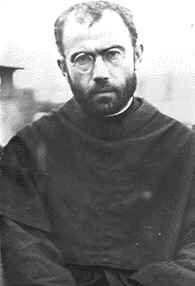 Today, we commemorate a saint of our time. St. Maximilian Mary Kolbe was born in 1894 in the then-Russian-occupied Poland. He became a Conventual Franciscan and was ordained to the priesthood in 1918. After serving as a missionary in Japan, Kolbe returned to Poland during World War II and when his Friary was closed in 1941 he was captured and imprisoned at Auschwitz.
Today, we commemorate a saint of our time. St. Maximilian Mary Kolbe was born in 1894 in the then-Russian-occupied Poland. He became a Conventual Franciscan and was ordained to the priesthood in 1918. After serving as a missionary in Japan, Kolbe returned to Poland during World War II and when his Friary was closed in 1941 he was captured and imprisoned at Auschwitz. After a prisoner escaped from the camp, ten others were selected to die as a punishment. One of the ten, Franciszek Gajowniczek, began to cry out that he would never see his family again. Prisoner number 16770 stepped forward and asked to take his place. Thus began the martyrdom of Fr. Kolbe. As for Franciszek Gajowniczek, he lived 53 more years and died in 1995 at the age of 95.
A snippet from today's Office of Readings from a letter of St. Maximilian gives us a window into the heart of so generous and so brave a man: "Obedience raises us beyond the limits of our littleness and puts us in harmony with God's will." St. Francis of Assisi is often quoted as saying, "Preach always, use words when you have to." This son of St. Francis died as a faithful and obedient servant (and "preacher") of the Gospel -- he laid down his life for a fellow prisoner.
Prior to his imprisonment, Kolbe established the sodality of the Militia of Mary Immaculate. Click here to learn more about it.
"Charity and obedience are so closely united that they cannot possibly be separated. Love makes us obey promptly."
St. Francis de Sales
11 August 2006
Your Cross
God in His divine wisdom has
from all eternity beheld the cross
He bestows on you --
His precious gift
from His Heart.
He contemplated the cross
with his all-knowing eye
before bestowing it on you.
He pondered over it with His divine mind;
He examined it with His all-wise justice;
With his loving mercy
He warmed it through and through;
And with both His hands
He weighed it
to determine it be
one ounce too heavy for you.
He blessed it with His all-holy Name;
With His grace He anointed it;
And with His consolation
He perfumed it through and through;
And then once more
He considered you and your courage.
Finally it comes from heaven as a special message of God
to you,
an alms
of the all-merciful love
of God
for you.
08 August 2006
St. Dominic
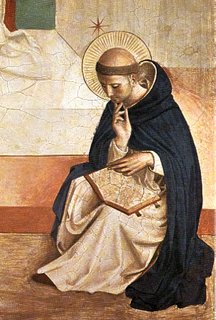 As we celebrate the Feast of St. Dominic, we shall defer to our Dominican brothers and sisters for words of wisdom about their Holy Father. Do visit the Summit Dominicans' blog and Fr. Powell's blog -- both of which will, no doubt, be honoring their Holy Founder.
As we celebrate the Feast of St. Dominic, we shall defer to our Dominican brothers and sisters for words of wisdom about their Holy Father. Do visit the Summit Dominicans' blog and Fr. Powell's blog -- both of which will, no doubt, be honoring their Holy Founder.06 August 2006
Feast of the Transfiguration
Fire is a powerful image throughout the Bible; it is a very striking symbol for the Peter, James and John who witness the Transfiguration of our Lord. For Peter, in particular, it is a significant symbol that marks his own transformation.
1 Peter 4:12-13
04 August 2006
Prophets and Experts
Not everybody who makes us uncomfortable is a "prophet." We need to discern the reason why we feel uncomfortable in the presence certain people; sometimes it is simply a matter of having more common ground with some folks than with others. Other times, however, it is the case that a resident "prophet" speaks some uncomfortable truths. Prophets aren't perfect; sometimes their observations are spoken uncharitably or at an inopportune time. It can be hard to be responsive amid challenging circumstances. Irrespective of such circumstances, however, let us beg for the grace to be open to the "resident prophets" in our own lives. The Lord can use many different means to get our attention and speak to our hearts. Let us not miss His message even if it is delivered by someone whom we know well.
"I have no doubt there will be aversions and repugnances in your spirit. . . . there are so many occasions to exercise the true virtue of sweetness; for we must do well and in a holy and loving way what we owe to everyone, although it may be against the grain and without relish."
02 August 2006
Dog Days of Summer

Yes, even the dog has a dog. This is a shot of our noble guard dog, Nicholas, trying to stay cool in these "dog days" of summer. In this picture, he is "protecting" Buddy, his toy dog, whom he treats like a real dog. (We're not sure exactly why he hasn't shredded Buddy, as labs tend to do with toys, but we're grateful and we enjoy watching him nurture the stuffed doggie.)
The temperature is supposed to reach a record 103 degrees today -- even Nick and Buddy will have to take their cuddling inside for most of the day.
No profound spiritual message here -- just a loving reminder to stay cool, hydrated, and out of the sun. St. Francis de Sales said that "We pray best before beauty." True indeed. It is also true that it is difficult to pray when one is hot, sticky, fatigued and dehydrated -- so, if you are experiencing a heat wave, take care of yourself!
31 July 2006
St. Ignatius
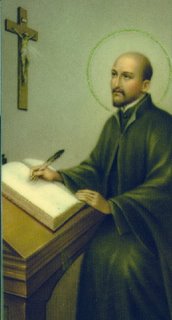 Our monastery of Georgetown has enjoyed a centuries-long friendship with the Society of Jesus. And so it is with a wink and a smile that we share this little gem:
Our monastery of Georgetown has enjoyed a centuries-long friendship with the Society of Jesus. And so it is with a wink and a smile that we share this little gem:Although we are unable to authenticate this statement, we have been told that Fr. Walter Burghardt, SJ once commented that St. Francis de Sales is - was - living proof that one could be educated by the Jesuits, have a Jesuit for a spiritual director and still be a good Catholic.
"If Geneva has worked such terrible ravage amongst us, it is because we were idle; while we were asleep the enemy set our house on fire and we should all of us have been lost if the Divine Goodness had not raised up the Fathers of the Society of Jesus, those powerful minds, those great men, possessed of such untiring courage, such intrepid zeal . . . who have re-established the true faith . . . and are filling the world with learned men and are destroying heresy in every direction."
29 July 2006
St. Martha the Hospitable

We are privileged to have this extraordinary oil on canvas of Jesus at Bethany hanging on the north wall of our chapel. It was commissioned by our second chaplain (and, more accurately, our second founder), Rev. Joseph Pierre Picot de Cloriviere as a gift from France to adorn our chapel. It was painted by Constance Blanchard (student of Girodot) in 1825 for a sum of 2,000 Francs.
On 8 July 1993 when our school building was consumed by a fire, this painting was rescued from the chapel (which connects the academy to the monastery building) by several of our chaplains who used rope cinctures from the sacristy to lower the massive framed picture. When the chapel was renovated and the picture restored, the cinctures were left in place as a reminder of the extraordinary event.
At risk of undermining the traditional homily for today's memorial about how Mary has chosen "the better part" and poor Martha is too busy, this is a little plug for moderation in our approach to today's Gospel. Please note that John's Gospel tells us that "when Martha heard that Jesus was coming, she went to meet him; but Mary sat at home." And Luke, prior to the very familiar scene where Mary is seated at Jesus' feet, tells us that "Jesus entered a village where a woman whose name was Martha welcomed him." Both Martha and Mary represent essential elements of our vocation as Christians: nurturing a relationship with the Word of God in the person of Jesus Christ -- as Mary did -- and welcoming others as Christ into our homes and our hearts -- as Martha did. And the Lord, as suggested in the painting, is found between the two: at the intersection of prayer and hospitality.
27 July 2006
Fidelity and Friendship
In today's first reading we are reminded of how the Israelites have betrayed Yahweh, worshipped idols, prophesied by Baal, forsaken the covenant. And despite their infidelity, the Lord continues to call them back to Himself; he continues to be faithful. For most of us, the experience of infidelity renders us (at best) cautious as we mend a relationship marred by this most painful of hurts. Let us ask for the grace to have hearts as generous and as loving as the Lord's eternal heart.
"Blessed are the hearts that can bend, for they shall never break."
St. Francis de Sales
25 July 2006
St. James the Greater
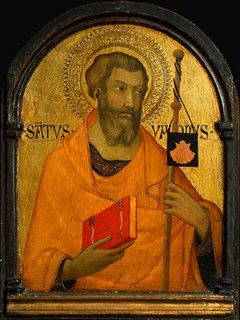 There is an adage that says, "If you pray for rain, you'd better bring an umbrella." Be careful what you ask for -- you just might get it!
There is an adage that says, "If you pray for rain, you'd better bring an umbrella." Be careful what you ask for -- you just might get it!In today's Gospel, we have the Mother of James and John asking Jesus to give them places of honor in his Kingdom. In his reply, Jesus hints at his suffering and death; he asks the two brothers if they can drink of his chalice and they both respond, "We can!" And tradition tells us that it was St. James who was the first apostle to suffer martyrdom under Herod around the year 42 A.D.
A cursory check of the letter of James demonstrates that he earned his name "Boanerges" (sons of thunder) for his firm and effective preaching. Although there is a great deal of legend that surrounds the devotion to this heroic saint, we can learn a powerful lesson from St. James: those who have left behind many things to follow Christ can be used by God as his instruments. In the call of the disciples, St. Peter leaves behind his nets, St. Matthew leaves behind his customs post and St. James, we learn, left behind his father. Each of us is called to leave behind something of his former life when we set out to follow Jesus. For some it is a lifestyle, for others it may be something material, and still others are called to leave behind family and friends. And just as the Lord used St. James to draw many people to himself, so we, too, can be available instruments in the hands of the Lord when we answer the call to follow him.
"We cannot continually have the presence of God; that belongs to the angels. When we do something for God, that is living in his presence."
St. Francis de Sales
23 July 2006
The "Rest" of the Summer
Sometimes we are called beyond the littleness of our own plans to attend to the circumstances which the Lord permits in our life. Surely Jesus was as tired as the disciples were when he invited them to take a rest; Jesus' reaction, however, to the crowd which filled the "deserted place" was one of compassion and "he began to teach them many things." Sometimes we are called to adjust our plans and our expectations to suit the needs of the present moment. Sometimes we are called to readjust our priorities and our schedule before we even have a chance to begin some of what we set out to accomplish. This takes great trust in the Lord's providential care for us. Jesus practiced this hidden virtue at every turn in his journey on earth.
The next time our plans to find a "deserted place" are frustrated, let us remember the example of Jesus and his disciples. Let us remember that the circumstances in which the Lord permits us to find ourselves contain countless opportunities for us to unite ourselves to His will. Embracing these circumstances is a great mark of virtue. When asked if a sister should miss Mass on a holy day of obligation in order to remain in the infirmary with a sick sister, St. Francis de Sales replied:
"You may and you should lose Mass to stay with her, even though no harm would come to her if she were left alone; for remember, charity and the holy sweet love of our dear Mother Church are above all things."
20 July 2006
Gospel Roots
When we speak about our own "Salesian Spirituality" we refer to the legacy left to those of us who claim St. Francis de Sales as our spiritual father (and there are many of us in the Salesian family!) If one had to ground all the writings of St. Francis de Sales' in one passage of the Gospels, today's reading would represent our "spiritual roots."
St. Francis de Sales had the following to say about the importance of the "little virtue" of gentleness:
"An even temper, gentleness and sweetness are more rare than perfect chastity but no less desirable for that. I command these virtues to you because the flame of good example depends upon them as oil in a lamp; nothing edifies others more than a loving good temper."
17 July 2006
Nursery School Update
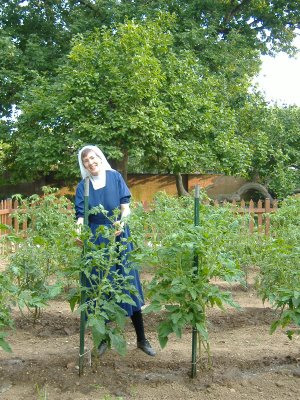
Faithful readers will remember that we featured our nursery school graduates as they were moving out into the garden in late May. Here we provide a little update on our transplants. Sister Earlene, faithful "waterer" of the tomato patch, is pictured here between two robust Brandywine tomato plants.
"God's providence reaches all things, and reduces all things to His glory."
15 July 2006
A Word of Thanks
11 July 2006
...And The Humble Shall Be Exalted
Yesterday morning at 11.00am the Rite of Christian burial was celebrated for our beloved Sister Anne Marie. In attendance were close to 400 of Sister's "closest friends," principal celebrant Rev. Jon O'Brien, sj, 12 concelebrants and her loving family and community.
Saint Peter approaches Jesus and says, "You'll never believe this, Lord, she called me 'dearie.'" Jesus looks at Saint Peter and replies, "She's been calling me 'dearie' for years!"
As a member of the monastery and vibrant presence in the school community for over 69 years, Sister leaves an inestimable loss. Mr. Daniel Kerns, jr remarked in one of the eulogies, "None of us here has ever known Georgetown Visitation without the presence of Sister Anne Marie." Well said.
The monastery community is deeply grateful for the many people who shared their time and resources with us in order to make Sister's wake and funeral such a profound experience for all present.
08 July 2006
Pushing Buttons?
In keeping with Sister Anne Marie's loving embrace of everyone who crossed her path, we share the following excerpt from our local Catholic paper, The Catholic Standard, dated Friday 31 October 1952, which was written about Sister Anne Marie:
"Whether it's Eisenhower or Stevenson, the November 5 spirit should be something like one exemplified by a nun here in Washington, who shall remain nameless but who's gifted with an ample sense of humor.
Seems that ever since school started, this nun's been collecting campaign buttons from the students. Each day she's been sporting a different one, but generally it has been of the 'I like Ike' variety.
The other day, a Stevenson button adorned her habit. An aghast student exclaimed: 'Why Sister, don't tell me you've changed sides!' Sister didn't get it for an instant, then remembered the Stevenson button with an, 'Oh, you mean this.' She assured the student she hadn't changed sides and by way of emphasis, lifted a sort of cape-like effect at the top of her habit. She was wearing dozens of buttons, for both Stevenson and Eisenhower, under the cape.
But right in the middle there was an extra large one which bore this legend:
It is a profound understatement to say that our dear Sister Anne Marie "liked everybody." Not only did she love every sister, student, guest and family member whom she encountered, she made sure that each one felt loved.
A word to our locals: the Mass of Christian Burial on Monday has been moved from the Chapel of the Sacred Heart to the Nolan Center to accommodate the number of guests anticipated. Those in need of an elevator may enter from the Canney Terrace; all else may enter via the north and south lobbies across from St. Joseph's Hall. Sunday's wake will remain in the Chapel of the Sacred Heart.
05 July 2006
The Face that Launched 1,000 Quips

At 1.10pm today the Lord came for our dear Sister Anne Marie. Sister became very ill just a few weeks ago and died very peacefully surrounded by her sisters. Sister was 97 years old and 69 years professed. Until just a few weeks ago she could be found working in the main office of our school at "Sister Anne Marie's Shredding Station," a popular spot for teachers and staff passing through the office.
Sister will be remembered for many things. She was a "Jane" of all trades whose various undertakings included music, art, pottery, and knitting. Sister was the among the first in our community to use a computer and generate greeting cards. More recently, she was known for the sale of her "famous poster" which hit the market 10 years ago in an effort to help raise money to rebuild our chapel. When asked about her poster she'd often wink and say, "Could you make $40,000 off your face?"
It is an understatement to say that sister leaves an indelible mark on the hearts of all who knew her. Those of us who were privileged to live with her will miss her outstanding example of fidelity in prayer. Sister spent so much time praying in the chapel that one might have mistaken her for a statue. We will miss her witty responses to daily conversations: If we called her name, we often received the following reply "She's not here dearie, can I give her a message when I see her?" Recently, Mother dared to ask, "How are you feeling today, sister?" and with a twinkle in her eye she replied, "If I told you the truth you'd put on your hat and leave town!"
For years Sister Anne Marie would greet our chaplains as they arrived each morning. As she would wait outside the chapel, she would also greet any guests who came for Mass. If it had been a long time since a guest's last visit, sister would use her stage-whisper to remark, "It's nice to see you back in the Church, dearie." She made every visitor and guest feel welcome and loved. Hospitality flowed through her veins and touched all who knew her. We know that she will find her place in the heavenly Visitation among our beloved sisters who have gone before her. Requiescat in pace.
For locals, the wake will be on Sunday night from 5-8pm and the funeral will be on Monday morning at 11.00am. Both will take place in our Chapel of the Sacred Heart.
03 July 2006
The Coming of the Fourth
- In what year was the anthem written?
- What was Francis Scott Key's occupation?
- Why was he aboard a British ship when he wrote our national anthem?
- What other American was present when the poem was penned?
- How many stanzas are in the original version of the national anthem?
As we celebrate our nation's freedom this week, we remain mindful of our responsibility as a powerful country with an abundance of resources. And we pray that we may always act justly and wisely. Click here to read Dr. Asimov's article.
01 July 2006
The Centurion's Sentiment
26 June 2006
The Master Cometh!
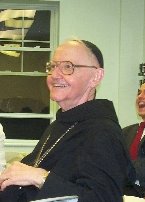 In the wake of the Second Vatican Council, as the use of the vernacular in the liturgy became the focus of many well-intentioned efforts at aggiornamento -- often at the expense of ressourcement -- the Order of the Visitation in the United States received a great gift: the work and expertise of Abbot Marcel Rooney, osb.
In the wake of the Second Vatican Council, as the use of the vernacular in the liturgy became the focus of many well-intentioned efforts at aggiornamento -- often at the expense of ressourcement -- the Order of the Visitation in the United States received a great gift: the work and expertise of Abbot Marcel Rooney, osb. Periodically he visits our monasteries for a little "brush up" and "up date." This week we are privileged to have Abbot Marcel with us for a few days. Faithful readers can expect a short hiatus in blogposts while the master is here...we shall return in a few days.
23 June 2006
Solemnity of the Sacred Heart
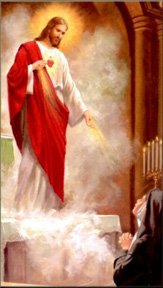 On Friday 11 June 1611, (Friday in the Octave of Corpus Christi that year) St. Francis de Sales addressed a letter to (St.) Mother de Chantal, Sr. Jeanne Charlotte de Brechard and Sr. Jacqueline Favre. The content of this letter was a description of an inspiration which he received about the coat of arms for the Order of the Visitation. He suggested a heart pierced by two arrows, surrounded by a crown of thorns. This "inspiration" became the design for the seal of every monastery of the Visitation.
On Friday 11 June 1611, (Friday in the Octave of Corpus Christi that year) St. Francis de Sales addressed a letter to (St.) Mother de Chantal, Sr. Jeanne Charlotte de Brechard and Sr. Jacqueline Favre. The content of this letter was a description of an inspiration which he received about the coat of arms for the Order of the Visitation. He suggested a heart pierced by two arrows, surrounded by a crown of thorns. This "inspiration" became the design for the seal of every monastery of the Visitation.Well over 50 years later, St. Margaret Mary, a Visitation nun in our monastery of Paray-le-monial, received revelations of the Most Sacred Heart of Jesus. The date later set for this Solemnity is currently the Second Friday after Trinity Sunday (which ends up being the Friday after Corpus Christi -- we just don't have an Octave of Corpus Christi any more.)
St. Francis de Sales spoke poignantly when he remarked, in that letter concerning our coat of arms, "...our little congregation is a work of the heart of Jesus and Mary. The dying savior gave birth to us through the wound of his Sacred Heart."
22 June 2006
God's Honor Roll
Let us take our cues from these great heroes of our faith and allow the Lord to work through us in the ordinary moments of our daily lives.
"I would inculcate in your deepest hearts this disposition to obey and to submit yourselves lovingly to all events and permissions of Holy Providence."
20 June 2006
Home Base!

No, this is not a joke, honest. This sign is actually exists. Due to our current state of renovation (updated pictures forthcoming), we spend a great deal of time "commuting" between "refugee camps" and, as a consequence, our security staff has posted the above caution for drivers entering campus.
As promised, quite a few posts ago, this is a report from one of our three "refugee camps." Lalor House is serving as "home base" during our period of exile. Eight sisters live at Lalor House but all 18 of us pray, eat and recreate here. The picture below is our modest chapel which, believe it or not, fits all 18 of us, the celebrant and a guest or two (without a shoe horn!)
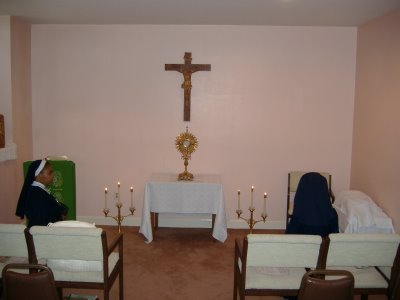 The picture below is a shot of Lalor House from 35th Street. The front door opens to 35th Street but the back entrances open up onto campus which makes getting to the school -- and the other two "refugee camps" -- very convenient. We promise future posts about the satellite refugee camps -- and maybe even a first-hand account from an exile!
The picture below is a shot of Lalor House from 35th Street. The front door opens to 35th Street but the back entrances open up onto campus which makes getting to the school -- and the other two "refugee camps" -- very convenient. We promise future posts about the satellite refugee camps -- and maybe even a first-hand account from an exile! 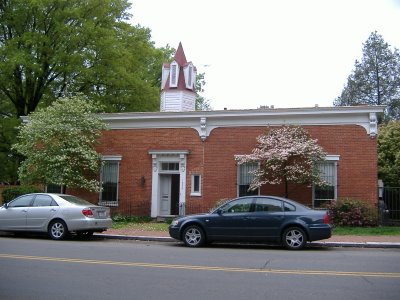
This post would not be complete without a photo of a very special exile who lives at Lalor House: Nicholas the dog, whom some readers may remember from a previous post. Nick lives in a pen outside Lalor House and he announces every visitor who approaches. We hardly need a doorbell with a watch dog as alert as he. In fact, it used to be the bell ringing the Angelus which told the sisters that Father has arrived for Mass. Now, the dog announces it before sister has a chance to ring the bell. If only we could teach him to bark in syncopation with the Angelus! 
18 June 2006
The Solemnity of Corpus Christi
In recent decades, we have spoken often about the Eucharist as a meal; we refer to the altar as a “table.” Indeed, we do commemorate the Last Supper, but we also commemorate the sacrifice of the cross. When we consider the Mass as a sacrifice, we present to our hearts an invitation to unite our sufferings, our sacrifices with the most holy sacrifice on the altar.
Let’s be honest: the various elements of liturgy can introduce many opportunities for differences to arise among the most well-meaning of participants. Be they differences in taste or disagreements about style, attending or planning a liturgy amid such challenges can be difficult. It can be hard to pray under such circumstances.
Any number of situations can cause us unrest when we come to worship the Lord. We may come to Mass from a situation which was stressful and we are distracted; perhaps we come to Mass and find ourselves uncomfortable because of elements of preference beyond our control; it might be the case that we are responsible for some service during the Mass such as reading or singing; we may find ourselves sitting at Mass worrying about whether or not we turned off the stove. Any of these situations can cause our hearts to be distracted and minds to wander. Every one of these situations, however, is an opportunity to place our hearts on the altar. When, at Mass, we find ourselves in a situation where our souls are not at rest – for any reason – perhaps we could call to mind the sacrificial dimension of the Mass. When we are suffering, hurt, frustrated, or distracted, we have something to offer the Lord. Instead of gritting our teeth and allowing smoke to escape from our ears, perhaps we could unite our little sacrifice, the cause of our unrest, to the Lord's sacrifice. "Here it is, Lord. It may be small compared to your sacrifice, but it's all I have to offer right now." And may He look with favor on our offering.
"In the Eucharist, our Lord abases Himself, if we may so express it, and changes Himself into food, so that He may penetrate our souls and unite Himself most intimately to the heart and to the body of His faithful."
15 June 2006
Tough Love
13 June 2006
A Salty Claim
11 June 2006
Solemnity of the Most Holy Trinity
 One cannot do justice to the mystery of the Trinity in a blog post. One can only approach this mystery by living well the relationships and personal encounters that are provided by the Lord. (What follows are a few simple thoughts.)
One cannot do justice to the mystery of the Trinity in a blog post. One can only approach this mystery by living well the relationships and personal encounters that are provided by the Lord. (What follows are a few simple thoughts.)In today's first reading, Moses reflects upon the unique relationship between Yahweh and Israel; he asks, ". . . ever since God created man upon the earth; ask from one end of the sky to the other: Did anything so great ever happen before?" No. Nothing in the history of the world -- prior to the Incarnation -- can compare with the creation of man and God's delight in chosen people.
The first creation story in Genesis gives us a window into the mystery of the Trinity: "Then God said, 'Let us make man in our image'" (Gen 1:26a). God did not say, "Let me make man in my image." The Holy Trinity was present at creation and it is in the image of the Trinity that man was created. "Man" was created male and female. From the dawn of time, God has desired that his creatures, those created in his likeness, imitate him -- the mystery of the Trinity -- in their earthly life. As essential as it is to cultivate a deep relationship with the Trinity, it is never apart from or at the expense of our relationships with one another. For man was not created alone; he was created in the image of the Trinity.
"Our felicity will not stop at this (namely, at conversation with the angels and saints, with Mary and the incarnate Redeemer). It will pass further, for we will see face to face and very clearly the Divine Majesty, the essence God, and the mystery of the Most Holy Trinity."
09 June 2006
Thinking and Acting Globally
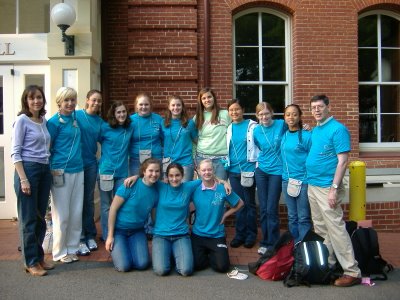
We have shared this quotation before, but it is very fitting for this occasion. When our early sisters in France set out for a new foundation, St. Francis de Sales had these words for the occasion:
“Those who go, stay. Those who stay, go.”
07 June 2006
Commencement!
 At 11.00am, yesterday morning, 133 soon-to-be graduates processed two-by-two down the red carpet as the familiar notes of Elgar were performed by a brass ensemble. Our school's largest graduating class in its 207 year history was addressed by Ms. Gretchen Kane, president of the Ursuline Academy in New Orleans.
At 11.00am, yesterday morning, 133 soon-to-be graduates processed two-by-two down the red carpet as the familiar notes of Elgar were performed by a brass ensemble. Our school's largest graduating class in its 207 year history was addressed by Ms. Gretchen Kane, president of the Ursuline Academy in New Orleans.Ms. Kane shared some of her experiences from the past year as the oldest girls' school in the country, ravaged by a hurricane, prepared to open its doors on 3 January 2006 -- just 4 months after the city of New Orleans was buried in water. Ursuline Academy, during the months of rebuilding and restoring, was committed to returning tuition dollars and continuing its payroll -- not because they could afford to, but because, in justice, they couldn't afford not to! In her speech, Ms. Kane referred to C.S. Lewis' characters in The Lion, the Witch and the Wardrobe. She recalled how the raccoon family allowed their young to play in the mane of Aslan, the lion. When asked if it was safe to play in the lion's mane, the father replied, "It is not safe, but it is good." And so it is for those who choose Christ's way of love and gentleness in a world that does not value Christian virtues. It is not safe but it is good. In this vein, her parting words of wisdom to the class of 2006 were the very words she used in her own high school yearbook, "March to the beat of your own drum or don't march at all!"
Also in attendance at graduation was Ursuline Academy's recent graduate, Courtney Pratt, who spent the first semester of her senior year with us here at Georgetown Visitation. She received the signature "crescent pin," which our graduates receive with their diplomas, as well as a standing ovation from Visitation's class of 2006.
Beautiful weather. Beautiful young women. We and they have much for which to be grateful.
04 June 2006
Veni Creator Spiritus!
This is a true story (and could be sub-titled, "Life in the monastery is never boring part III") :
02 June 2006
Baby Ducks!
 A couple of weeks ago we mentioned the pair of ducks who have arrived on our lawn. Shortly thereafter, they disappeared for awhile, only to reappear with their new family!
A couple of weeks ago we mentioned the pair of ducks who have arrived on our lawn. Shortly thereafter, they disappeared for awhile, only to reappear with their new family!At right, Mrs. Duck instructs the little ones to beware of nuns who toss pieces of bread at them.
Below, the ducklings wait by the P Street wall while Mrs. Duck takes a moment to scold the sisters for getting to close to her precious little ones. (We got the message, loudly and clearly!)


Although he was not out for a walk with the little critters, we caught a picture of the proud father. We promise not to bore our readers with too many duck photos, but these were too cute not to share.
31 May 2006
Solemnity of the Visitation
29 May 2006
Memorial Day
Jesus' reminder found in today's Gospel speaks a word of encouragement to those who have lost life, limb or loved one in the name of liberty. Those men and women who have laid down their lives on the altar of our freedom have walked a noble path behind the Lord's example. We honor those whose sacrifices have purchased our nation's freedom and defended the safety of countless other countries and peoples.
Few hymnals print all six verses of the Julia Howe's (pictured below) Battle Hymn of the Republic. The fifth verse bears repeating. Current arrangers and publishers have changed Howe's original words. It is here reprinted in its original.
- In the beauty of the lilies Christ was born across the sea.
- With a glory in His bosom that transfigures you and me:

- As He died to make men holy, let us die to make men free;
- While God is marching on. Glory! Glory! Hallelujah!
- Glory! Glory! Hallelujah!Glory! Glory! Hallelujah! While God is marching on.
As we commemorate Memorial Day, we remember all those who have purchased our freedom and defended our safety. May we be mindful and grateful for their service.
"In all things holy liberty and freedom must reign, that we may have no other law or constraint than that of love . . . "
St. Francis de Sales
27 May 2006
The Ascension(s) of the Lord!
All kidding aside, here in the metropolitan Archdiocese of Washington, DC we celebrate Ascension Thursday in place of the Seventh Sunday of Easter. And as we wait in hope for the coming of the Holy Spirit, we are reminded of part of Jesus' farewell discourse in the Gospel of John. In both yesterday's and today's Gospel, Jesus speaks of joy. A joy that "no one can take away." This is, perhaps, the hallmark of a healthy Christian life. Despite circumstances which may be difficult, the great mystery of our salvation, begun with the Incarnation and crowned with the Ascension, is the source of our hope and joy.
Whatever day you celebrate(d) the Ascension of the Lord, may it bring a profound sense of joy and an abiding peace in the Lord's good providence.
25 May 2006
St. Bede the Venerable
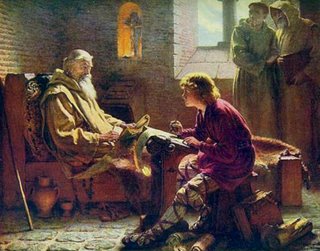 Shown here on his deathbed, dictating the last of his scholarly work to a young monk, St. Bede the Venerable is one of the lesser known doctors of the Church.
Shown here on his deathbed, dictating the last of his scholarly work to a young monk, St. Bede the Venerable is one of the lesser known doctors of the Church.St. Bede is often mistaken for a Benedictine. A careful reading of his work "The History of the Monasteries of Wearmouth and Jarrow," however, reveals that St. Benedict Biscop, although trained by the Benedictines in Lerins, when he founded the Monasteries, constructed a rule for monastic life based upon several monastic rules which were in existence at the time.
23 May 2006
Squirrel Farmers
 This is a true story. Last August we noticed a vine growing several yards from the vegetable garden. It appeared to be something in the melon, cucumber or squash family and it covered a small area of shallow dirt comprised mostly of cedar mulch. Each of the sisters who work outside in the garden thought that another sister had planted the vine and carefully avoided uprooting it. Eventually, the truth came out: none of us planted the mysterious vine. The only logical conclusion: the squirrels.
This is a true story. Last August we noticed a vine growing several yards from the vegetable garden. It appeared to be something in the melon, cucumber or squash family and it covered a small area of shallow dirt comprised mostly of cedar mulch. Each of the sisters who work outside in the garden thought that another sister had planted the vine and carefully avoided uprooting it. Eventually, the truth came out: none of us planted the mysterious vine. The only logical conclusion: the squirrels.The compost heap is just a short walk from the location of the "mystery vine" and squirrels can often be seen rummaging through the compost pile for a snack. It seems likely that, upon finding some delectable seeds, one clever squirrel buried them in the shallow patch of dirt and mulch. At the end of the summer we enjoyed two sweet, juicy musk melons -- all thanks to the squirrels.
Just last week, this sprout was spotted in the same location. It is too soon to determine what type of fruit or vegetable it is, but it looks as thought the squirrels might have just planted us another tasty treat!
21 May 2006
Who Has Chosen Whom?
John 15:16
It is very easy to believe that our faith is to be credited to us -- as though we could choose to believe in the Incarnation, in the Eucharist, etc. Most of us become aware -- or remind ourselves often -- that faith itself is a gift from God. The desires to know God, to learn about God, to pray to God are all initiated by him. Even when we feel drawn to pray at a particular moment, we must remember that it is only a response to something that God has done first in our hearts. He is always one step ahead of us.
And today we are reminded that even the fundamental "yes" to follow the Lord -- to choose him as the center of our lives -- is also a mere response on our part. For it is he who has first called us, drawn us, led us to himself. This is a welcome reminder when we begin to feel inadequate or underqualified for some work that comes our way. We remember, in these moments, that the Lord does not call us because we are eminently qualified for some work he has in mind for us; rather, he provides the graces necessary, for those whom he calls, to carry out his work.
Today's Gospel is indeed good news: we are chosen. He has chosen us and called us and he will provide the graces necessary for us to be fruitful. Let us rejoice and be glad: we have been called and chosen. Let us resist the temptation to feel unprepared or discouraged when the Lord asks something of us.
19 May 2006
New Neighbors
 Mr. and Mrs. Duck have moved onto our lawn. They are pictured here crossing the path between Lalor House and the School (as they flee from the Sr. Mary Snapshot).
Mr. and Mrs. Duck have moved onto our lawn. They are pictured here crossing the path between Lalor House and the School (as they flee from the Sr. Mary Snapshot).
St. Francis de Sales didn't have much to say about ducks (bees, yes; ducks, no). He did, however, have a great deal to say about our neighbors and how we treat them. A few thoughts in that vein:
"We should not be like the Paphlagonian partridge which has two hearts, towards ourselves, gentle and loving but toward our neighbor one that is hard and severe. . . . Put yourself in your neighbor's place and him in yours, and then you will judge fairly."
17 May 2006
Welcome Bishop Wuerl!
 The archdiocese of Washington welcomes Bishop Donald Wuerl of Pittsburgh as its sixth archbishop. Yesterday morning, His Holiness Pope Benedict XVI announced his acceptance of the retirement of Theodore Cardinal McCarrick. There have been numerous articles and links on different news services. Cardinal McCarrick had some very gracious words about his successor during a press conference early yesterday. Kudos to Mr. P
The archdiocese of Washington welcomes Bishop Donald Wuerl of Pittsburgh as its sixth archbishop. Yesterday morning, His Holiness Pope Benedict XVI announced his acceptance of the retirement of Theodore Cardinal McCarrick. There have been numerous articles and links on different news services. Cardinal McCarrick had some very gracious words about his successor during a press conference early yesterday. Kudos to Mr. P almo for the first whisperings of this on 27 April. As usual, his coverage was thorough and articulate.
almo for the first whisperings of this on 27 April. As usual, his coverage was thorough and articulate.After a full day of press coverage, there is little left to be said about this exciting moment in our archdiocese that has not already been said. One quotation of Bishop Wuerl, however, bears highlighting. The New York Times reported that, when asked how he would handle the controversial and high-profile issue of pro-abortion politicians, his reply was, "I think the first job of a bishop is to teach." Right on. Welcome to Washington, your Excellency, we're ready to learn!
15 May 2006
'Tis the Season
 Tis the season...to plant and to sow, to weed and to reap. Today's commemoration of St. Isidore is a little-known and seldom celebrated outside of rural communities. St. Isidore, patron saint of farmers, was an eleventh century farmer known for his piety and devotion. His wife, Mary de la Cabeza is also revered as a saint.
Tis the season...to plant and to sow, to weed and to reap. Today's commemoration of St. Isidore is a little-known and seldom celebrated outside of rural communities. St. Isidore, patron saint of farmers, was an eleventh century farmer known for his piety and devotion. His wife, Mary de la Cabeza is also revered as a saint. Having spent his whole life working as a hired hand on a farm outside of Madrid, St. Isidore teaches us the timeless lesson that St. Francis de Sales would articulate and reiterate four centuries later: in all occupations holiness can be found, achieved and shared. Fidelity to the Lord, his wife and his daily work proved to be the path to holiness for this humble farmer.
13 May 2006
Nursery School Graduation
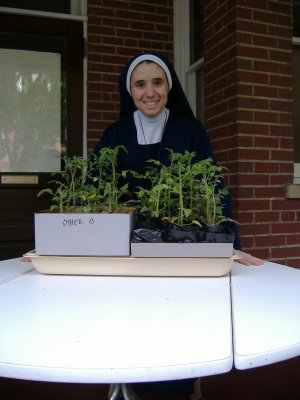 No caps. No gowns. No Pomp and Circumstance. This "nursery school graduation" is for 21 tomato plants that will be transplanted to the garden this morning. Sister Anne E poses with the graduating class at left. All the transplants were born in the 4th Floor Fennessy "refugee camp." (If you are wondering why nuns are living in a refugee camp, click here to read a previous post about our renovation.)
No caps. No gowns. No Pomp and Circumstance. This "nursery school graduation" is for 21 tomato plants that will be transplanted to the garden this morning. Sister Anne E poses with the graduating class at left. All the transplants were born in the 4th Floor Fennessy "refugee camp." (If you are wondering why nuns are living in a refugee camp, click here to read a previous post about our renovation.)
All reports from the 4th Floor "refugee camp" confirm that this is a welcome day since the "grow light" which has been in the hall since mid-March is so bright sisters are able to read a book in the "dark" after turning in for the night.
All kidding aside, a garden provides ample opportunity to reflect upon the mystery of creation. Perhaps one of the highlights of something like a "nursery school graduation" is the thrill of looking at a plant and remembering when it was only a seed: dry, lifeless and tiny. It is a small window into the mystery of God himself to be able to look at a healthy plant and say, "I knew you when you were only a seed." Surely God must look at us and say the same thing.
"Be still and bloom where you are planted."
St. Francis de Sales
11 May 2006
On Friendship and Charity
09 May 2006
Demolition Details
 As promised, we will not abuse the patience of our readers with innumerable photos of every stage of our rebuilding -- just a small number of pictures for a peek into the work-in-progress.
As promised, we will not abuse the patience of our readers with innumerable photos of every stage of our rebuilding -- just a small number of pictures for a peek into the work-in-progress.Prior to the beginning of demolition, our project manager labeled all parts of the structure to be "demo" or "save." The orange graffiti added an interesting highlight to the muted colors of our walls. Some of the walls, as they come down, reveal extraordinary hand-crafted workmanship including some hand-fashioned nails.

Up-coming construction updates will include reports (and photos) from the "refugee camps" where the "nuns-in-exile" are living. Stay tuned!
"What a delightful and profitable law this is to do nothing except for God and to leave to Him the whole care of ourselves! I do not say only as regards temporal things ... but I refer to spiritual things and the advancement of our souls."St. Francis de Sales
07 May 2006
World Day of Prayer for Vocations
05 May 2006
Into the Lion's Den
03 May 2006
The Circus is Coming to Town!
 This post could be subtitled "Life in the monastery is never dull, installment II."
This post could be subtitled "Life in the monastery is never dull, installment II."The circus is not only "in town" but they are parked, for a few days, in our parking lot! Not the whole circus but a very significant part of the circus: the circus nuns. (We're not kidding!). Three members of The Little Sisters of Jesus (one of whom is an alumna of ours) travel with the Carson and Barnes Circus. While they travel with the circus they minister to the members of the circus in a host of different ways -- both physical and spiritual. They catechize the children, counsel adults, mend costumes, collect tickets and help care for the animals. To read more about their beautiful ministry, click here.
We have been been blest by the presence of the Little Sisters of Jesus who have joined us for Mass and Office these past few days. Their apostolate is certainly a beautiful testimony to the Gospel call to leave everything and follow the Lord. As they prepare to move along, we share St. Francis de Sales' sentiments which often punctuated a farewell when sisters said good-bye to begin a new foundation: "Those who go, stay; those who stay, go." We have enjoyed having our "circus sisters" with us and we send our love and prayers with them on their way.
To read more about Bl. Charles de Foucauld, the founder of the Little Sisters of Jesus, click here. To read more about Carson and Barnes Circus, visit their webpage or their blog.
01 May 2006
Month of Mary
“The Madonna was for [the early disciples] mother and teacher, a role she continues to develop for the Christians of every age. Each year in Eastertide, we relive most intensely this experience and maybe for this reason the popular tradition has consecrated to Mary the month of May, which normally falls between Easter and Pentecost. This month, which we begin [today], is useful for us to rediscover the maternal function which she develops in our lives, that we may always be docile disciples and courageous witnesses of the risen Lord.”
As we strive to do the Lord’s will in our daily lives – the little day to day decisions as well as the more significant ones – let us fix our eyes on Mary who was so faithful a disciple; from the moment she said, “Yes” to the Angel’s message, her life was never the same. Mary allowed her love for God and His incarnate Son to be the defining boundary for all her actions. Mary’s love for the Lord showed itself in her profound union with the Lord’s will for her throughout her life – in the few details we learn in the Gospels and the many details that remain obscured on this side of eternity. May she intercede for us and teach us to unite our hearts as lovingly as she did to the will of her Son.
“The fruit of love is obedience . . . Oh, my God! How happy we would be, if we were recognized by the exact practice of the solid virtues of our vocation, as the Son of God, in this world, made Himself known by the works of His mission!” St. Jane de Chantal



